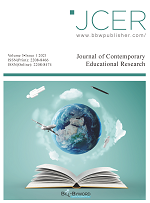Abstract
Translation is a complicated thinking and a practicing process, which involves many theories and skills. According to the theory of dynamic equivalence and based on literature studies as well as personal practical experiences, three viewpoints have been proposed in this article to discuss on how to translate a newly-introduced concept; namely, giving full consideration to the meaning of newly-introduced concepts, paying attention to the evolution of the concepts, and seeking for a similar meaning in the traditional classics of a nation, each of which is exemplified in order to facilitate understanding.
References
Nida EA, Taber CR, (eds) 1969, The Theory and Practice of Translation, E. J. Brill, Leiden, 178-179.
Nida EA, (eds) 1964, Toward a Science of Translating, E. J. Brill, Leiden, 156, 243, 166-169.
Wu S, 2006, Foreigner’ Rights and Chinese’s Levels: Selecting Translation Vs Inheriting or Changing Tradition. Well-Read, 2006(8): 4-11.
Yang Q, Tang F, 2011, The Origin and Development of Geometry. Shanghai Journal of Translators, 2011(3): 74-78.
